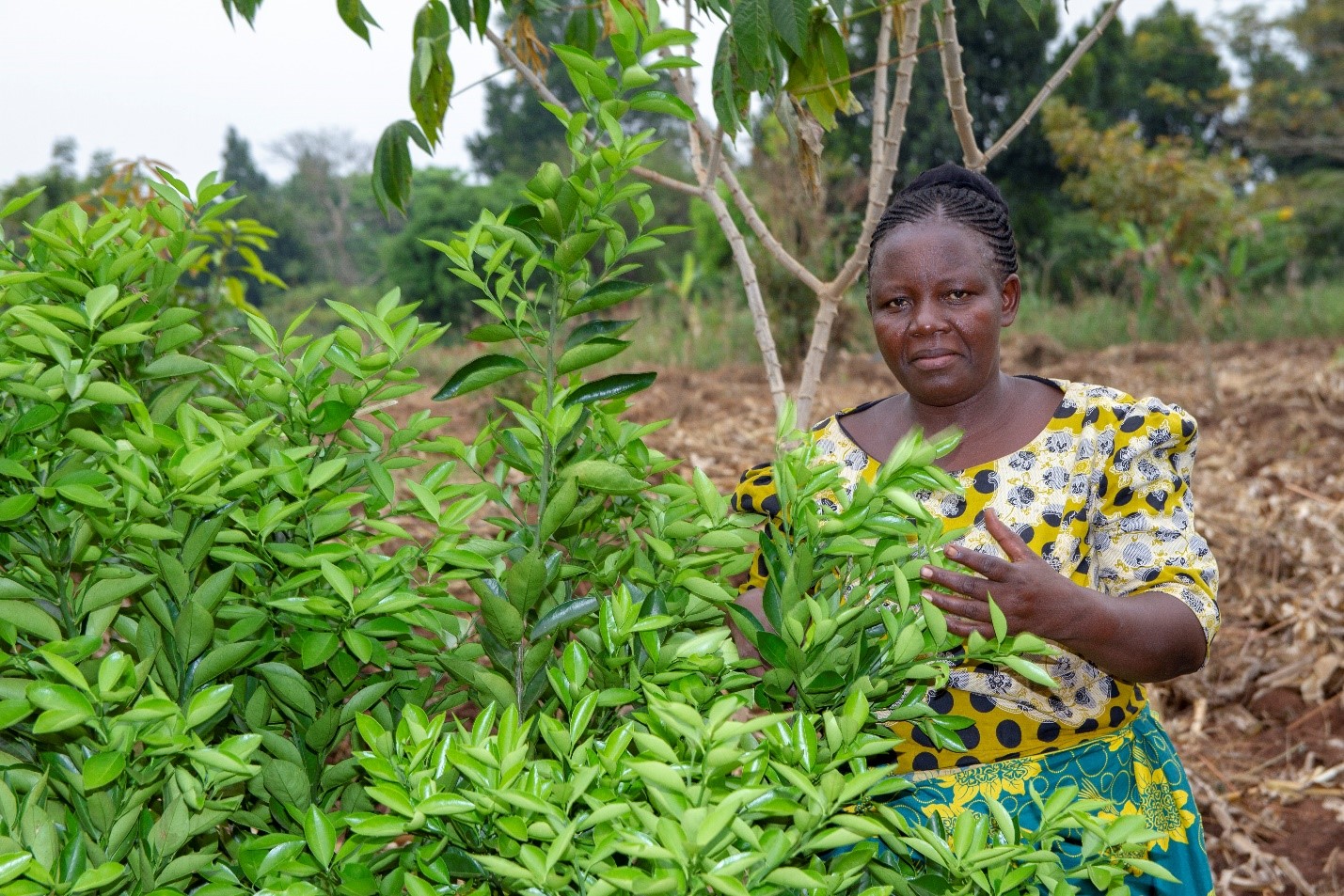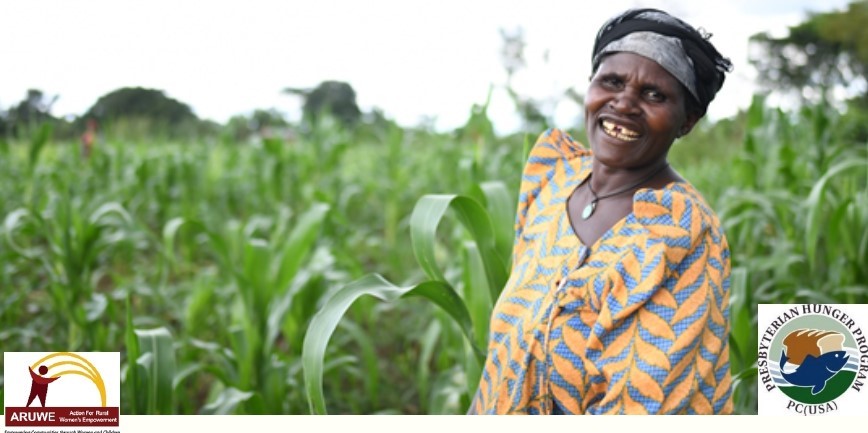PHP partner ARUWE celebrates 5 years of land rights victories in Uganda
By Agnes Mirembe and Sylvia Nalubega | ARUWE Uganda

Women in their rice farm securing their production for food and income. Photo by Francis Matovu, ARUWE Uganda 2019.
Nagawa, a 39-year-old farmer in Kasubi village, Gayaza Sub County in Kyankwanzi district Uganda awoke to the total destruction of her three-acre maize garden. She had received a loan of 500,000 Uganda shillings ($135) to set up her garden. The loss of food and potential income was devastating to Nagawa because she was left with no means of taking care of her five children.
Nagawa is among several farmers from the same village whose crops were destroyed due to unresolved land conflicts due to poor boundary demarcations, lack of proper registration documents and a general lack of awareness of the provisions made for citizens in the national land instruments of Uganda.
In response to the plight of Nagawa and thousands of rural women whose land rights have been violated, Action for Rural Women’s Empowerment (ARUWE) Uganda has been partnering with the Presbyterian Hunger Program since 2016 to promote the rights of women to land and property in Kyankwanzi district. The program is one of the major land rights interventions for communities in the district.
Women are the greatest contributors to food security and nutrition not only for their homes but for their communities and the country as a whole. Women make up 66% of the agricultural work force in Uganda, so women’s rights to access, own and make decisions over land as a production resource is of paramount importance. Moreover, land security promotes a sense of belonging and control over affairs in one’s life.
ARUWE began this long journey by promoting massive awareness of national land instruments such as the National Land Act, the National Land Policy, land governance structures at the community, district and national levels as well as educating citizens on their responsibilities. ARUWE has reached over 2500 women and 1600 men through radio programs, print media, theatrical events, community meetings and dialogues.
ARUWE partnered with Semwanga & Muwazi advocates to provide legal aid to community members who have had land issues. And ARUWE formed a movement of women farmers to advocate for increased access and utilization of land governance services. There are also a few male allies who advocate for women’s land rights. To empower the community further, ARUWE built the capacity of 28 paralegals to provide information pertaining to land issues as well as referrals.
“When women have security on land, they are able to grow enough food, generate income from land as a production resource and have a sense of belonging in society,” Says Teopista Namusisi, a woman farmer and paralegal in Kyankwanzi district (November 2019).
Due to the increased demand for improved land governance structures at the community level, ARUWE partnered with the district land board and the technical team in the land office and trained over 20 members of the local land governance structures including the area land management committees, grade one courts and the police. The local governance structures play a key role in conflict resolution and peace building on land issues and provide information on national land laws and registration as well as refer cases to higher offices.
The community also demanded for female inclusion on the land governance structures and as such Ms Ganyana Juliet was chosen to be the chairperson of the district land board. Having a fellow woman on the district land board gave women the confidence to always approach Ms Ganyana Juliet with their land issues and she in turn directed them to the technical land offices for support. Furthermore, the area land management committees had at least a 40% representation of women compared to 10% before our work.
Through the continuous assessments that ARUWE has conducted, it was discovered that property and land rights violations that were reported included: unlawful and illegal evictions of tenants from land, instances of trespassing, insufficient or lack of land registration documents as proof of ownership, corruption, limited or no knowledge of justice systems as well as limited or no control over decision making on land (primarily affects women)
Approximately 560 households in eleven villages in Gayaza Sub County alone were affected by land conflicts in 2018. Unresolved land conflicts, at times, force families to migrate, leading to unplanned costs, loss of property, food insecurity, loss of social relations as well as education interruption for children.
Land conflicts in families is also worth noting. The struggle for the ownership and occupancy of land often arises between relatives and siblings since they can have competing interests on the same land. Women receive unequal treatment when it comes to inheriting land. It is worth noting that according to the law, both women and men are equal and can own land. However, in many family settings in our society, women are not allowed to own land, which creates many conflicts and disputes. Widows and orphaned children suffer the most from these conflicts when relatives seek to evict them from their land and house. The situation is made worse if the deceased partner did not leave a will to protect his widow and the children.
Najjuma, a 56-year-old widow taking care of 8 grandchildren in Kasubi village, was able to secure her 8-acres land from her in-laws and landlord who wanted to unlawfully evict her. Armed with knowledge from the trainings, Najjuma was able to defend her rights through the community land governance structures to stop the unlawful eviction. Since she is secure on her land, Najjuma was able to set up two acres of demonstration plots of beans and maize on her land and she is now a community trainer in good agriculture practices.
At the community level, a notable cause of conflict is the limited knowledge on the land tenure systems which affects the residents’ application for land registration. Kyankwanzi district has three tenure systems including private Mailo land, Public land and freehold. Having a land certificate in one’s name (s) is the most important security on land. Unfortunately, many residents of Kyankwanzi district, especially women do not possess documents to prove their ownership and formally legalize their stay on land. Those who have land sale agreements, which are legally recognized, still have no guarantee that it is enough to secure their land. Moreover, many have purchased land from people who have defrauded them.
Nagawa fell victim to fraudulent people who sold her land that belonged to another person. She had no knowledge of how to do a proper land search to ensure that there was no double ownership. She was not able to locate the person who sold her the land due to lack of identification. Many farmers like Nagawa have lost their hard-earned money due to limited knowledge on the proper procedures of land purchase and registration.
ARUWE together with the movement of women farmers and male change agents organized dialogues with duty bearers and decision makers in land governance to manage land cases, increase access to land registration forms as well as reduce the time spent to acquire a certificate.
“Because of the knowledge I have acquired in this program, I have been able to acquire three acres of land and I got my land certificate in February 2020. I followed the procedures of registration and I am so happy to show my land certificate. I have established maize and cassava gardens for food production and income. I have also planted trees to demarcate my land boundaries as well as contribute to climate change mitigation efforts,” said a one happy 54-year old Namuli from Kasubi village. Please note that a person who has no land documents or a land title cannot ably plant trees on that land. This counters the efforts of mitigating effects of climate change.
ARUWE documents an amazing journey of successes and challenges that provide opportunities for communities especially the women farmers to realize their land rights.
- In 2016, the project focused on awareness raising, reaching over 300 people with information on land rights in Gayaza Sub County, Kyankwanzi district.
- In 2017, 30 groups of 900 rural women farmers were formed in Kyankwanzi district to have a collective voice in advocating for their land rights and access to justice through awareness and legal aid clinics.
- In 2018, ARUWE conducted a needs assessment on land issues in Kyankwanzi district and 898 people (597 women and 301 men) gained knowledge in gender and land related conflicts, advocacy, registration procedures and land tenure systems. 213 households were supported to document their land cases. Cases included illegal solicitation of high nominal ground rent fees, eviction and trespass.
- In 2019,
- the Kyankwanzi District land board provided maps to show the different tenure systems for improved land registration, trained 20 area land committee members from four more sub counties. 384 community members got knowledge on the procedures on land registration as well as rights and responsibilities of citizens to secure tenure. 57 households from 4 villages submitted their documents for registration having been empowered with knowledge.
- In 2020, ARUWE initiated radio dialogues in Kitabona Sub County, the community advocated for the district land office to be opened since it had been closed during the COVID-19 constraints. The office was opened, and people were able to access it. 9 members have submitted their registration papers. A village of 24 households contacted the district surveyor to demarcate their land to stop the exploitation by an unjust landlord.
ARUWE joined national land rights networks such as the Participatory Ecological Land Use Management Uganda, Stand for her land” national land rights campaign with the World Bank, Justice for Women, Buganda land board, Land justice network, and other CSOs. Through the platforms, ARUWE amplified the issues of rural women on land issues to inform resource allocation therein.
“More than ever, we the women are more confident to acquire land to do our agricultural activities as well as other income generating projects. Knowing the proper steps of acquiring land and documentation on the different tenure systems has enabled us to make informed land purchases. At least 80% of the members in my group of 25 are saving towards acquiring land for agriculture. I can assure you that the pride of my fellow women is having a land title certificate in their names,” said Margaret a leader of the Abassa ekimu women group in Kasubi village.
“The project has enabled me to engage my community members on land issues more than ever. I see my community members becoming more vigilant to secure their land through registration. I give them support through information and directing them to the relevant offices,” Community Development Officer, Kitabona sub county.
ARUWE understands that community is at the forefront of realizing their land rights. Land acquisition for women is slowly being demystified and they are making strides towards acquiring and registering their land.
Though land issues are sensitive and usually cause duty bearers to shy away from them as some of them are the land rights violators, this program has enlisted high participation of the same. Duty bearers are eager to commit to actions from dialogues to improve land governance services because they realize the need for communities, especially for women, to access and own land for stability and development.
We continue to dedicate our efforts to promoting equitable access and control over land as a production resource for rural women to enhance their meaningful contribution to food security and economic development.
The work of the Presbyterian Hunger Program is possible thanks to your gifts to One Great Hour of Sharing.

